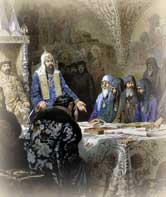 Archpriest Avvakum was appalled. The Russian Orthodox church had an
overbearing new Patriarch, Nikon. This zealot wanted to incorporate into
the liturgy changes borrowed from the Roman church. As Avvakum and many
others saw it, these changes threatened the purity of the old faith.
Their protests were met with appalling cruelty. Tsarevna Sof'ya decreed
that Old Believers were to be tortured. Any who remained
"obstinate" were to be burnt to death.
Archpriest Avvakum was appalled. The Russian Orthodox church had an
overbearing new Patriarch, Nikon. This zealot wanted to incorporate into
the liturgy changes borrowed from the Roman church. As Avvakum and many
others saw it, these changes threatened the purity of the old faith.
Their protests were met with appalling cruelty. Tsarevna Sof'ya decreed
that Old Believers were to be tortured. Any who remained
"obstinate" were to be burnt to death.Avvakum became spokesman for the Old Believers. Fortunately for Russia, he was not immediately sentenced to death, but instead chained, imprisoned, beaten, spat upon and exiled to Siberia. He and his family survived by eating offal that wolves had rejected. Two of his sons died under these wretched conditions. Forced to join an expedition to Amur under a brutal leader, Avvakum spoke out against the cruelty. For this, he was flogged and chained to a barge overnight in a cold, autumn downpour. Then the faithful witness was thrown naked into a cell, "but God kept me warm without clothes!" he reported.
What use was his protest against the liturgical changes? he wondered. The new formulas spread no matter what he said. He asked his wife if he should continue to speak or hold his peace. "You have tied me down," he said, thinking of her sufferings and those of his children.
"Lord have mercy, what are you saying Petrovich?" the good woman replied. "I and the children bless you: dare to preach God's word as heretofore and do not feel anxious about us; so long as God wills it, we shall live together, and if we are parted, remember us in your prayers. Christ will not abandon us!" Shaking off his temporary "blindness of discouragement," Avvakum renewed his preaching.
For all her faith, his wife could not help asking her husband once, "How long will this suffering last, Archpriest ?" Till death, he answered. Sighing she said, "So be it, Petrovich; let us trudge on."
Trudge on Avvakum did. Imprisoned, he wrote hundreds of pages of doctrine. He also produced an autobiography. Written in a zestful, contemporary Russian, it is considered a milestone of the language much as Pascal's Provincial Letters are for French and Chaucer's Canterbury Tales for English. Its concise immediacy was unsurpassed until Tolstoy. Friendly jailers winked as Avvakum's well-wishers smuggled out his tracts and the text of the autobiography.
Thousands of the Old Believers were executed. Avvakum's turn came on this day April 14, 1682. At Tsar Theodore's order, he and his fellow prisoners were locked in a log cabin and burned alive. Thus perished in flame a spiritual hero and literary genius whose remembrance endures to this day.
Bibliography:
- Avvakum, Petrovich. The Life of the Archpriest Avvakum, by himself. Translated from the seventeenth century Russian by Jane Harrison and Hope Mirrlees with a preface by Prince D.S. Mirsky. London, Hogarth Press, 1963.
- Dowley, Tim, ed. Eerdman's Handbook to the History of Christianity. Berkhamsted, Herts, England: Lion Publishing, 1977.
- Various internet articles